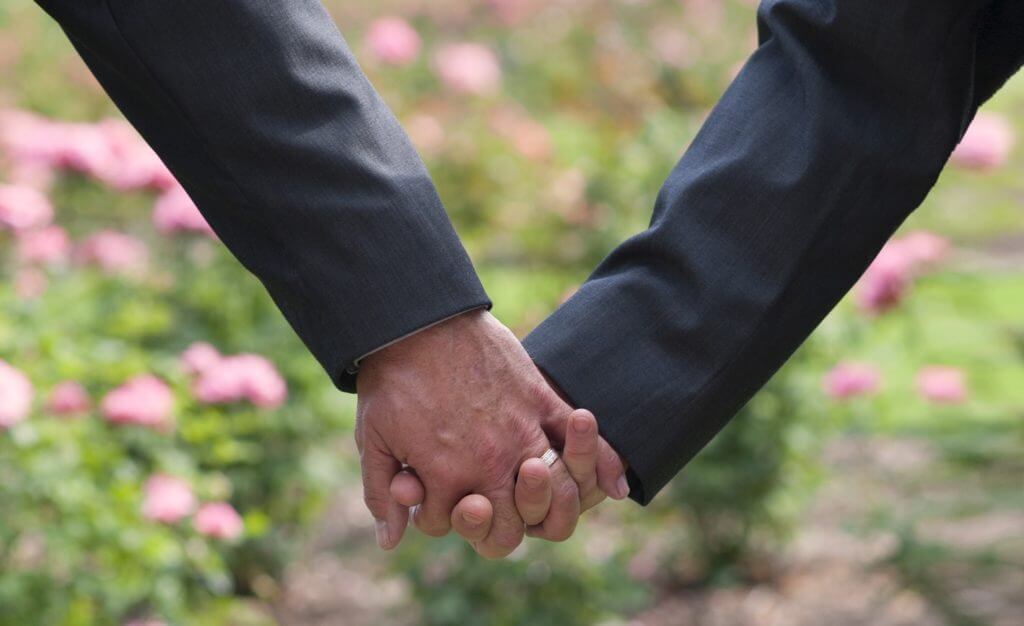Note from Lisa: My heart breaks for the victims of the recent horrific slaughter at a gay nightclub in Orlando, and for the LGBT community everywhere, suffering terribly from this murder of innocents.
But none of us should be silent. None of us should stop the work, not even for a moment. We have won marriage equality in the US, and we’re not going back. So here’s my piece about the progress we have made. It is dedicated to those who lost their lives in Orlando, who had the courage to celebrate their beautiful LGBT identities.
My elderly friend Carlton died recently. He chose to be buried not in a suit, but in a simple T-shirt that he’d had specially made for the occasion. This one:
That’s how important the Court’s recognition of his marriage to Steve—their thirty-seven yearpartnership—was to him. This law has had a profound impact on millions of Americans like Carlton and Steve.
It’s been one year since the U.S. Supreme Court ruled that same-sex partners had the right to marry nationwide. So it feels like the right time to ask: how are we doing?
No falling sky
The last 12 months have seen a wave of celebration in the LGBTQ community, and a proud recognition that all Americans are entitled to equal treatment, dignity, and respect for their choice of spouses. None of the dire predictions of those who opposed marriage equality have come to pass. We have not all slid down some “slippery slope” to marriage with animals, children and inanimate objects. Gay people have continued to demonstrate that they are just as fit to be parents of biological, adoptive or foster children as straight folks. The sanctity of straight marriage, whatever that means, remains intact, since same sex marriages have no impact on them.
One year later, as the earth continues to spin on its axis, it’s hard to believe any of those arguments were made with a straight face, pun intended.
A year ago, lawyers fighting the recognition of marriage equality pursued more sophisticated arguments as well, claiming to defend the rights of religious ministries, parents and Christianity. Their doomsday predictions have also not come to pass. The tax-exempt status of non-profit ministries is not under attack. Parents still have a say in what their children are taught about relationships and marriage in public schools and at home. Christian college accreditation stands. Government-backed student-loans at those colleges continue. Faith-based adoption agencies remain in business. Christian businesses soldier on, no matter what certain profoundly misguided county clerks believe.
More financial equality
Meanwhile, for same-sex spouses, the benefits are enormous. Same-sex married couples now qualify for federal benefits that were previously only available to heterosexuals, along with big financial boosts from certain Social Security programs they were previously denied, like spousal survivor benefits, spousal retirement benefits, and lump-sum death benefits.
Filing joint income tax returns with the IRS can now save couples thousands of dollars a year. Steve estimates he and Carlton saved $7-8000 a year once they could be “married filing jointly.” They can enjoy estate tax and estate planning benefits. Spouses of deceased veterans are entitled to health care, death pensions, educational assistance, home loan guarantees, vocational training and bereavement counseling. And the list goes on:
- Spouses of living military personnel may be eligible for health care, family separation pay, and relocation assistance, among many other benefits.
- Same-sex spouses of federal employees are now entitled to health insurance, and surviving spouses of deceased federal workers are entitled to numerous benefits as well.
- A non-U.S. citizen may obtain a nonimmigrant visa or a green card, and later citizenship status, when engaged or married to a U.S. citizen – whether the couples are same sex or opposite sex.
New attitudes
According to a recent Avvo study, attitudes continue to change toward acceptance of same sex marriage (I would expect this to continue as more people come to know openly gay or lesbian married couples). One year after the SCOTUS ruling, 48% of Americans believe same sex marriage should be legal, up five points from a year ago. Women favor same sex marriage more than men (50% and 47% respectively), and Democrats (68% favor) more than Republicans (26% favor).
For Carlton’s surviving spouse Steve, one of the most important marital rights was “the right to supersede decisions family members might try to foist on either of us in a time of crisis.” Steve was not only glued to Carlton’s bedside in his final months of fighting off brain tumors, but he was legally entitled to make all of the painful but important end of life decisions on Carlton’s behalf. A huge relief to them both.
But talk to anyone in a same sex marriage, and you will hear something like this: “The real advantage is immeasurable though intangible,” Steve said. “It’s hard to explain but it just FELT different being married. Being married imposes a far greater responsibility on the partners to stick around to try to work out problems, whereas before, people were freer to just pack up and walk away when difficult issues arose.” Carlton believed that that was the biggest why gay relationships historically were often short lived—so much social ostracism, so little support.
The power of the Court’s decision loomed large in Steve and Carlton’s lives. I am so glad Carlton lived to see state recognition of his incredible love story with Steve. And as Carlton took his last breaths, Steve held him and said, “You are my husband, you are my husband, you are my husband.” In other words, “We are one, not just in our hearts but legally in the eyes of the world. We have been seen and respected.” And that made all the difference.




